Once the daily destination for well over a million commuters, central London has been eerily empty for the last year or so. Things are picking up again as lockdown restrictions have lifted to a large degree, but people returning to the rat race face a different landscape.
For one thing, crowded, close-contact public transport hasn’t become more attractive since Covid-19 struck, yet while cars are perfect for socially distanced travel, driving into central London was never hugely fun, and has become even less so with the rise of Low-Traffic Neighbourhoods (LTNs). These and similar schemes have become popular with local councils over the last year and, while each is different, they generally work by closing residential roads off to drivers, diverting them instead on to arterial routes, often fining those who fail to spot the warning signs.
- SEE MORE Cheapest hybrid cars 2021
London isn’t the only city to be making such changes, either, with LTNs springing up across the country, and low- emission zones like London’s soon-to-expand ULEZ figuring more prominently in the minds of urban planners. It’s a brave new world then, and one where how we travel into town warrants scrutiny, and new solutions are worth weighing up.
We thought we would do just that, completing a nine-mile capital commute from the suburbs of south-west London into the heart of Fitzrovia. I would take our favourite city car, the Volkswagen up!, my colleague Dean Gibson would be on an electric scooter, while Rich Ingram would be captaining Citroen’s electric Ami quadricycle.
Citroen Ami
If the electric car is the future, there’s surely no better urban commuter than the Citroen Ami. While it’s not yet on sale in the UK, the brand’s Free2Move initiative is already up and running in France, where you can rent one of these dinky quadricycles for as little as 26 cents (22 pence) per minute. So for the purpose of this investigation, we’ll imagine we’re filtering through the cobbled streets of Paris, rather than the congested cut-throughs of central London.
Regardless, it’s clear from the off – as I watch Dean nip down the inside at a set of traffic lights – that despite its diminutive size, the Ami’s got nothing on the scooter. It’s also obvious, as the up! looms large in my rear-view mirror, that I’ve no tangible advantage over the petrol-powered VW.
But to take the Ami at face value would be to miss the point. If Citroen does bring it to the UK, the two-seat, plastic-bodied city car will likely be offered as part of a similar car-sharing scheme to that currently available in France – meaning you don’t need to worry about parking, road charges or even topping up the battery – you just pick one up locally, and drop it off at your destination.
It’s arguable that we’ve chosen the perfect day to be driving an Ami; it’s not too hot, not too cold. There’s no air-conditioning on board, but even with the spring sun warming the cabin, I manage to stay cool with the 2CV-style side windows flipped open. Within
minutes I catch a man asking his friend: “What on earth is that?” as he points his cameraphone in my direction. Suffice to say I’ve had less attention driving a Lamborghini through Knightsbridge in the past.
With Dean long gone, there’s really very little to separate the Citroen and VW. The up!’s superior power is of little use on London’s clogged roads, and not once do I feel the Ami could do with a bit more punch; its instant throttle response and near-30mph top speed allows it to keep pace throughout.
I’m lucky that as Hugo approaches a set of lights, the Ami and I manage to sneak away – and it stays that way to our destination. Ignoring my colleague’s inability to find the entrance to Fitzroy Square, it’s likely the Citroen would have taken second place by default had we been using the EV as intended. As we mentioned, should the Ami come to the UK in an official capacity, all I’d need to do would be locate a drop-off point on the app, park up and log out. I expect Hugo would have been driving around for another 20 minutes trying to find a car park.
Volkswagen up!
I love the Volkswagen up!, and I’m not the only one. Despite being unveiled a decade ago, it remains our favourite city car – simply because nothing better in this class has come along.
Small, agile and – particularly in the GTI guise we have here – brisk, the up! is as good as a petrol car can get when it comes to urban commuting. Setting off to our starting point in south-west London, I feel smug as I put the heated seats on their highest setting, taking the chill off the morning and knowing that neither Dean nor Rich will have such a luxury.
We meet up at the official starting point for our shared journey, and the little VW and its tight turning circle are of great benefit when scooting around a roundabout for some cornering photographs. Choosing the up! gives as much chance to reassess driving in London as it does the car itself, though, and as I park up in a bay when waiting for Rich and Dean to make their parades for the camera, I find my first ‘anti-car’ experience of the day. Or at least anti-engine, because the space I’ve chosen is for EVs only.
Briskly moving off from my transgression, we head to the river for more photographs, and I spot a sign barring motor vehicles from the road unless they’re driving there for access. I wonder if we’re allowed to be where we are and, while it turns out we’re fine, the fact my initial concern was that we may be lining ourselves up for some kind of penalty says much about how unwelcome car drivers can feel in London.
Riverside photos done, we begin our journey proper, heading across Putney Bridge and up through Fulham, Earl’s Court, across Paddington and on to our final destination, Fitzroy Square. Rich and I are following Google Maps and Dean his nose, and while I miss a turn and lose the others, Rich and I soon rejoin each other, the Ami’s inability to squeeze through gaps found by the scooter making it comparable to the VW in terms of its traffic-busting abilities. Rich makes a better lane choice at a set of traffic lights and pulls ahead of me, and I’m now following him, hoping I can make a similar move before we finish our journey so I can claim victory over the little French upstart.
- SEE MORE Cheapest cars on sale 2021
Alas, this is not to be and, as we near Fitzroy Square, some traffic-light phasing means I lose sight of him. No matter, I think, because I’m less than half a mile from the square. It’s now, however, where things go wrong, and the changes to London’s roads in the past year or so make themselves felt.
Fitzroy Square used to be accessible by at least two points, but this has now shrunk to one, and I simply cannot find it. Google Maps is no help, either, directing me to a road that is closed with bollards, then sending me on a wild goose chase that takes a good 20 minutes of one-way systems and stop-start traffic, only to land me back at the same closed road.
Dean and Rich have already arrived at our destination, and Dean some time ago, so he comes out on the scooter to lead me into the square for the day’s final photocall.
I am, by this point, not only late, but stressed, and even the up!’s air-conditioning can’t help cool me down. We get photos sorted, bid our farewells, and I head home, taking well over an hour to cover the final nine miles.
The up!’s vastly superior range promises a lot more freedom than the Ami or scooter do, and I have hundreds of miles left in the tank. But in terms of the journey we’ve just done? Well things haven’t improved for car drivers in central London – especially if you take a wrong turn.
Silence S01
It's no secret that two wheels are better than four when it comes to commuting – it’s one reason why the UK has seen a surge in cycling. Add power to the mix and you have even greater flexibility and, as with cars, electric drive is finding its way into motorcycles.
For our ‘race’, we’re using a Silence S01 electric scooter. The Spanish firm has a modest line-up, and this model is its flagship commuter bike. It’s surprisingly substantial – a rider and pillion can fit easily, and there’s a big storage space underneath. The lime green bodywork stands out (less lurid colours are available), although the S01 failed to draw any attention when it was parked next to the oddball blue/grey plastic brick that is the Ami.
Power comes from a 12bhp electric motor – 4bhp up on the Citroen – while the Silence’s 5.6kWh battery is slightly bigger, too. A maximum range of 80 miles is available, and a battery heater that activates when charging means the scooter’s range stays consistent, even when it’s cold. What’s more, the Silence app allows you to check the bike’s location and charge status remotely from your smartphone.
The S01’s party piece is that the battery is removable. Simply unlatch it, slide it out, lift the pop-up handle and it wheels around like a suitcase. It’s a hefty 40kg, but take the battery with you and the scooter is immobilised, while it takes eight hours to charge from flat via a three-pin plug socket.
- SEE MORE Best electric cars to buy 2021
What’s eerie about riding an electric scooter is the lack of noise. Petrol scooters drone away every time you open the throttle – with the S01, twist the grip and there’s just a discreet electric whistle. The bike’s 12bhp power output is equivalent to that of a 125cc scooter, but instant torque means the Silence accelerates like a 250cc machine. It’s great away from the lights, while filtering through traffic is a breeze, so I soon leave the Ami and up! trailing. Firm suspension does mean you feel every bump of London’s pitted roads through your backside, but our journey time was roughly half that of the Ami’s, so I wasn’t suffering for long.
I use my knowledge of London’s streets to find my way to Fitzroy Square, but there’s space on the steering yoke to sucker a smartphone if you need directions. Two-wheelers are exempt from London’s Congestion and ULEZ charges (for now), but I did encounter a restriction on Sloane Street where it’s only open to buses, taxis and cycles. I was surprised, because motorcycles are often permitted to use bus lanes, and thought this would work the same. However, it was only a minor irritation, and probably helped me avoid congestion up the road in Knightsbridge anyway. Whichever way I went, the S01 had a clear advantage in this test. The bike’s range read-out tallied with the actual miles covered, and with plenty of free motorcycle bays dotted around, you’re not struggling for somewhere to park, either.
While my time was quick, I was reminded that you need your wits about you when you’re on two wheels. Being able to filter through traffic means you can stick to main roads instead of using rat runs, but danger is everywhere. Errant pedestrians, U-turning taxis, vans stopping unexpectedly, kamikaze couriers, cyclists skipping red lights – we encountered all of the above. Combine that with exposure to the elements and the Silence’s relative, er, silence taking some road users by surprise, and it means an electric scooter won’t be everyone’s idea of fun. But the amount of time you save commuting means it’s hugely tempting.
Results
First place: Silence S01
- Time: 33 minutes
Second place: Citroen Ami
- Time: 1 hour
Third place: Volkswagen up!
- Time: 1 hour 20 minutes
It should come as little surprise that the Silence was quickest: it could slip through gaps the Citroen and VW could only dream of negotiating. These vehicles have different use cases, though: the up! is the only viable choice for a long-distance trip, while the Ami offers more stability and weather protection than a scooter.
If you’re happy with the extra exposure a scooter brings, the Silence makes a lot of sense in town, not least because its removable battery can be easily charged.
But it’s worth pointing out that £5,000 electric vehicles with limited ranges – be they rented or bought – will not work as the sole mode of transport for many. So while a car does have some shortcomings in town, the up! is arguably all the vehicle you would ever need.
Check out our list of the best commuter cars here...
from Sitewide RSS feed https://ift.tt/3fI4ERc
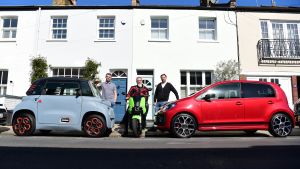
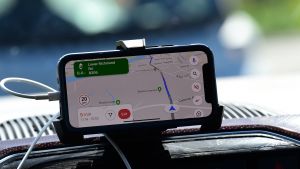
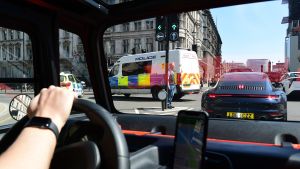
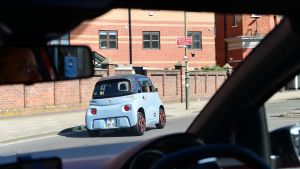
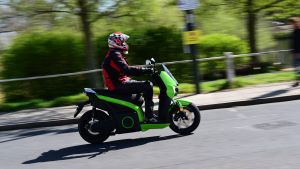
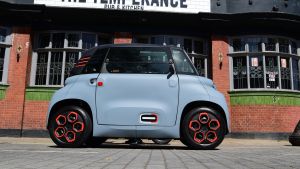
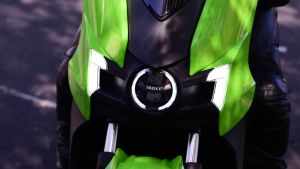
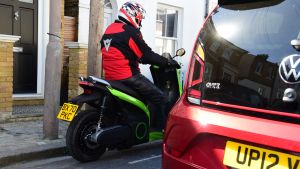


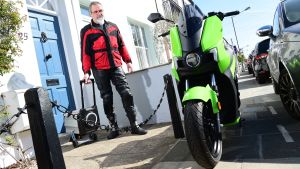

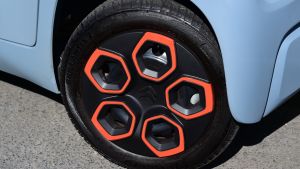
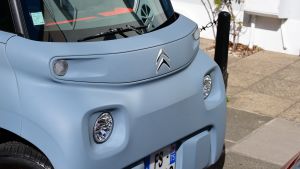
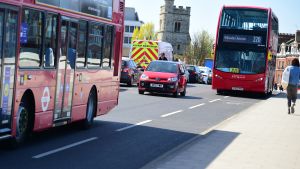
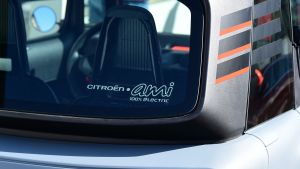
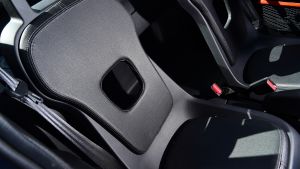
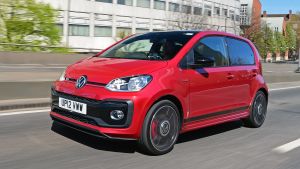
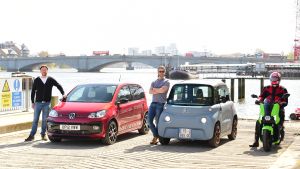

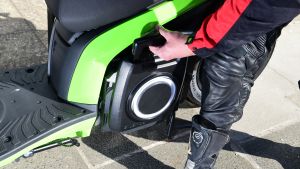
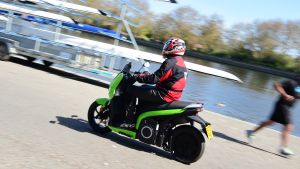
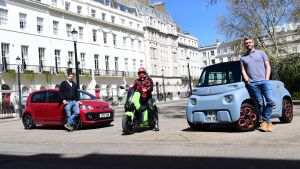

No comments:
Post a Comment